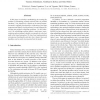Free Online Productivity Tools
i2Speak
i2Symbol
i2OCR
iTex2Img
iWeb2Print
iWeb2Shot
i2Type
iPdf2Split
iPdf2Merge
i2Bopomofo
i2Arabic
i2Style
i2Image
i2PDF
iLatex2Rtf
Sci2ools
104
click to vote
IPPS
2003
IEEE
2003
IEEE
Task Graph Scheduling Using Timed Automata
In this paper we develop a methodology for treating the problem of scheduling partially-ordered tasks on parallel machines. Our framework is based on the timed automaton model, originally developed for verification of real-time programs and digital circuits and more recently adapted for solving time-optimal scheduling problems. In this framework, the scheduling problem admits a state-space representation and an optimal schedule corresponds to a shortest path in the timed automaton. We check our implementation on numerous benchmarks and show how release times and deadlines can be easily incorporated into the model.
Distributed And Parallel Computing | IPPS 2003 | Scheduling Problem | Timed Automaton | Timed Automaton Model |
Related Content
| Added | 04 Jul 2010 |
| Updated | 04 Jul 2010 |
| Type | Conference |
| Year | 2003 |
| Where | IPPS |
| Authors | Yasmina Abdeddaïm, Abdelkarim Kerbaa, Oded Maler |
Comments (0)

